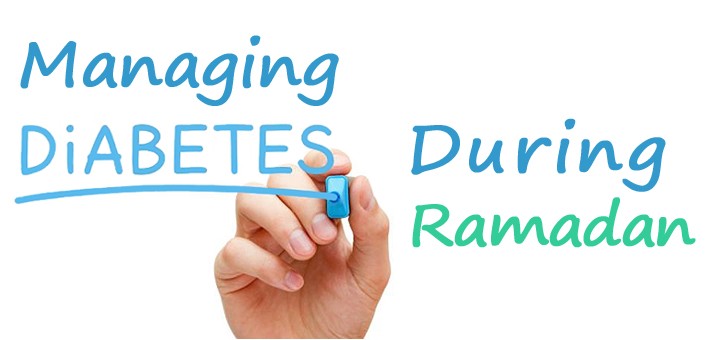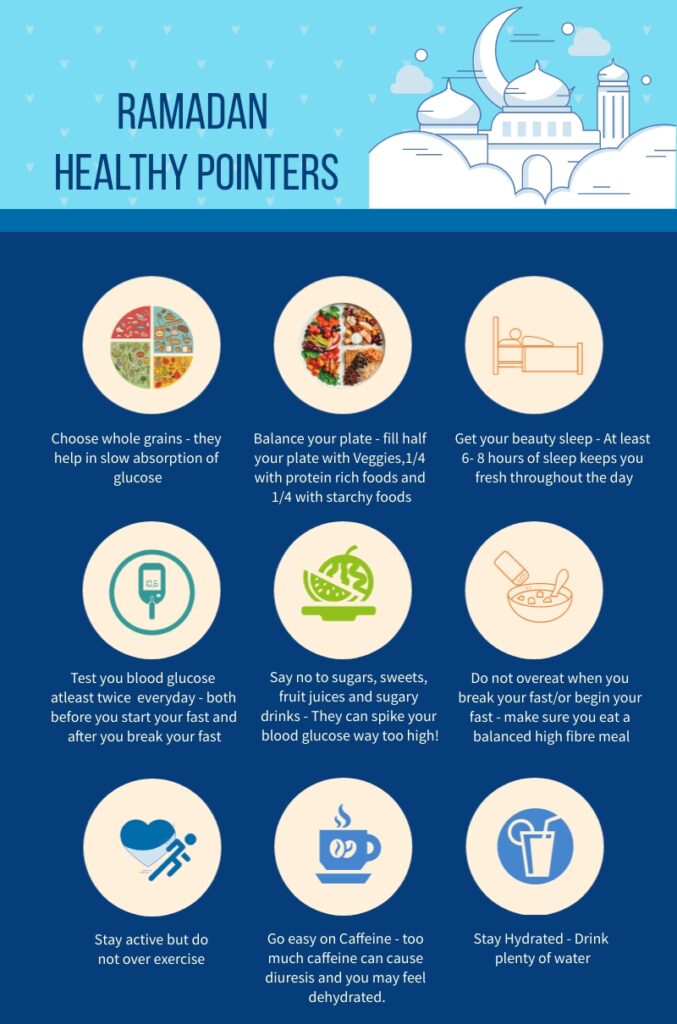A Safe, Diabetes-Friendly Ramadan

When the holy month of Ramadan arrives, 1.8 billion Muslims around the world celebrate the time when the Holy Quran was revealed to Prophet Muhammad (PBUH). As a part of the commemoration, all healthy Muslims must observe a dawn-to-dusk fast every day for the entire month – the fast involves abstaining from food, drinks, sexual activity, smoking, and even oral medication.
Unfortunately, such fasts pose a health risk to those with chronic conditions like diabetes. Ramadan can complicate the management of diabetes within the Muslim community, especially considering how over 150 million Muslims have been diagnosed with diabetes across the globe. There have been numerous studies done on the correlation between the mismanagement of diabetes and Ramadan.
Afraid of losing the Thawab (Reward), many Muslims with such chronic conditions still choose to take up the fast. People with borderline cases of diabetes can complete a fast without any complications, provided they take excellent care of themselves otherwise.
What Fasting Does to Your Body
Our body secretes insulin every time we eat, which increases the storage of glucose as glycogen in organs around the muscles and liver. When we fast, on the other hand, the glucose levels begin to fall rapidly along with the insulin levels. It causes the glycogen in our body to break down, and soon, the low levels of insulin in our bloodstream will lead to the breakdown of fats. These fats(fatty acids) are burnt for energy, producing ketones, which is used as fuel by our body, other than the brain. The surplus glucose is utilised continuously by the brain and by our white blood cells.
In healthy bodies, these complex processes are delicately regulated by the insulin levels and the hormones that keep the blood sugar levels at a manageable range. But in diabetes patients, the imbalance in insulin secretion can lead to many complications.
Risks of Fasting with Diabetes
Rapid changes in diet and lifestyle can jeopardise the lives of people with diabetes. If you are a diabetes patient, know that fasting puts you at risk of developing:
Hypoglycemia (low blood glucose levels)
Hypoglycemia is characterised by less than 70 mg/dl of blood glucose, often accompanied by symptoms such as shivering, sweating, nervousness, irritability and headaches. Sometimes lower levels can cause loss of consciousness and may lead to coma if untreated immediately. Usually occurs due to decreased food intake in relation to medication or exercise. One study showed that fasting during Ramadan increased the risk of developing hypoglycemia (and being hospitalised because of it) by 4.7 times in patients with Type 1 Diabetes and by 7.5 fold times in people with Type 2 Diabetes.
Hyperglycaemia (high blood glucose levels)
This extensive EPIDIAR study showed a fivefold increase in the occurrence of severe hyperglycemia (Abnormally high blood glucose) that requires intensive care in patients diagnosed with Type 2 Diabetes and a threefold increase in those with Type 1 Diabetes during Ramadan.
Diabetic ketoacidosis, if you have been diagnosed with type 1 Diabetes.
A study of the fasting diabetic patients during the month of Ramadan to examine the effect of fasting on their diabetic control showed that while fasting was safe for diabetic patients on oral hypoglycemic agents, they also stood the chance of losing weight or developing diabetic ketoacidosis ( a condition characterised by very high blood glucose levels, insulin insufficiency and high ketones in blood and urine, leading to coma if not immediately treated).
Severe dehydration
Drinking water is not allowed during the fasting period of Ramadan – some people even take this very far to the extent where they do not even swallow their saliva. The limitation of liquid intake can cause dehydration, which can cause many diabetes-related issues in people who perform work that causes them to sweat heavily. Such individuals also have a higher risk of blood clot formation.Diabetes.

Why You Should Consult a Doctor Before Ramadan
Research has shown that the pre-Ramadan assessment is crucial for a safe Ramadan experience, especially with the added risk of the Covid-19 Pandemic – even those who were not in the high-risk category before may find themselves in the very high-risk group.
You should visit your doctor six to eight weeks before the month begins so that you get an idea of where you stand in terms of risk – if the doctor advises you not to fast, do not be disheartened. Remember that according to the Quran, people who might fall ill after fasting are exempt from doing so and will still receive the same rewards (Thawab).
If the doctor gives you the nod, follow these tips to have a healthy Ramadan.
Tips for dealing with Diabetes during Ramadan
Even for those who have been classified in the low-risk category, disrupting the regular cycles of your eating and drinking habits can have a detrimental effect on your metabolism, blood nutrient levels and more.

To keep such complications to the minimum, follow these tips to keep abnormal levels of blood sugar levels at bay –
Check your blood sugar levels regularly.
Remember that monitoring your blood glucose levels and taking insulin injections do not break the fast by any means and are important steps to managing your diabetes. People in the high-risk category are advised to check their blood sugar levels thrice a day even if they are not fasting, but people at moderate or low-risk zones who observe Ramadan should check their blood glucose a minimum of two times every day.
Adjust Medication with your Doctor’s Help
It is possible to reorient your medicine intake cycle according to your fast timings. Ask your doctor for help so that you can reduce the risk of low blood sugar by changing the dose, timing, and type of medication.
Know when to break the fast
It is understandable if one feels disappointed when forced to break a fast, but if you show the following symptoms, do not think twice before consuming water, ORS, and easily digestible food:
- Blood sugar levels lower than 70mg/dl. Ensure that this returns to a 70-90mg/dl range within an hour.
- Blood sugar levels higher than 300mg/dl.
- Other symptoms of hypoglycemia/hyperglycemia/dehydration.
Exercise the right way
It is not recommended to work out rigorously during Ramadan if there is a risk of low blood sugar/dehydration. Light exercise, which includes bowing, kneeling, and rising in your daily prayers, is sufficient.
When the month draws to an end and Eid rolls around, exercise the same control you had throughout Ramadan and refrain from feasting on sweets. Your family’s happiness depends on your good health. So, use the dia home app to book appointments with our expert consultants/dietitians and educators to ensure a safe and enjoyable Ramadan.